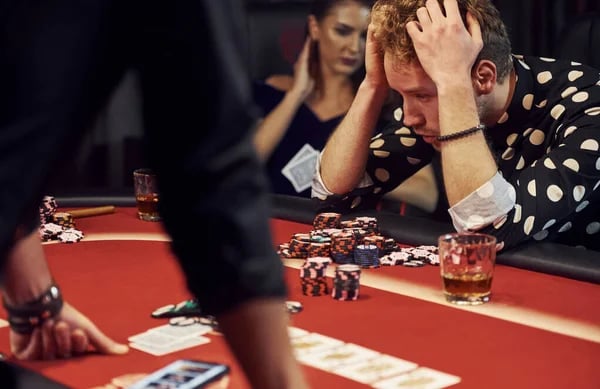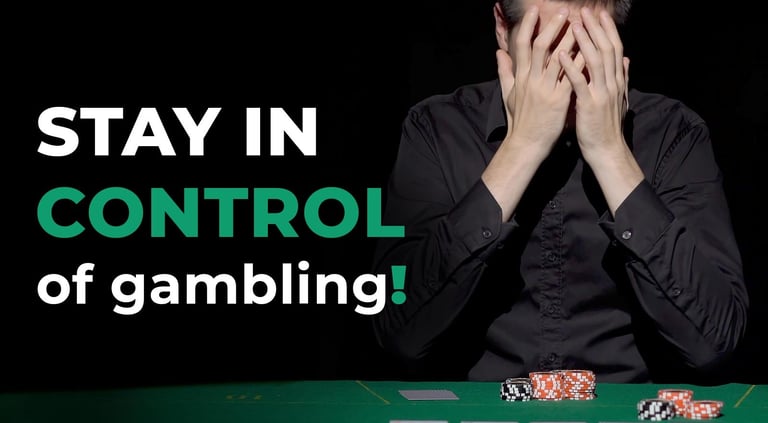How Gambling is Destroying Youth: Causes, Effects, and Solutions
Gambling addiction among youth is rising, affecting mental health, finances, and society. Learn how gambling is destroying youth and what can be done to stop it.
AWARENESS
9/5/20255 min read
Gambling has always been a part of human culture, from ancient dice games to modern casinos. But in recent years, gambling has transformed from a rare pastime into an easily accessible activity—especially for young people. With the rise of online casinos, sports betting apps, and flashy gaming advertisements, gambling has become just a click away. While many see gambling as harmless entertainment, it has quietly evolved into a serious threat to the younger generation’s mental health, financial stability, and future.
Today’s youth are growing up in a digital world where gambling is normalized, gamified, and promoted through social media influencers, gaming platforms, and even esports. This exposure has caused an alarming increase in gambling addiction among teenagers and young adults. In this blog, we’ll explore how gambling is destroying youth, why it’s spreading so rapidly, and what parents, educators, and communities can do to combat this crisis.
The Rise of Gambling Among Youth
Twenty years ago, gambling was mostly restricted to physical casinos and lottery tickets. Young people had limited access, and gambling required effort. Today, everything has changed.
Online gambling platforms: Young people can gamble from their phones without anyone noticing.
Sports betting apps: Sports are extremely popular among youth, making betting seem fun and harmless.
Video games and loot boxes: Gambling mechanics are embedded in games, teaching kids the thrill of risk and reward.
Social media marketing: Influencers promote casinos and betting apps, glamorizing gambling culture.
This constant exposure has made gambling more appealing and less taboo. Many teenagers gamble before they are even legally allowed, and by the time they reach adulthood, addiction has already set in.
Why Gambling is So Dangerous for Young People
Teenagers and young adults are more vulnerable to addiction than older adults because their brains are still developing. The prefrontal cortex, which controls decision-making and impulse control, doesn’t fully mature until around age 25. This makes young people more likely to:
Chase losses.
Take bigger risks.
Gamble impulsively without considering consequences.
The dopamine rush from winning reinforces risky behavior, making gambling feel exciting and rewarding. Over time, this can create a dangerous cycle that leads to addiction.
Mental Health Impact of Gambling on Youth
One of the most devastating effects of gambling on young people is its impact on mental health. Gambling addiction is often referred to as the “hidden illness” because it doesn’t have physical symptoms like drug or alcohol addiction, but its psychological toll is severe.
Common mental health effects include:
Anxiety and depression: Constant stress from financial losses and secrecy leads to emotional breakdowns.
Low self-esteem: Losing repeatedly makes youth feel worthless and hopeless.
Suicidal thoughts: Studies show that gambling addiction has one of the highest suicide rates among addictions.
Isolation: Young gamblers often withdraw from family and friends to hide their behavior.
For many young people, gambling becomes a coping mechanism to escape stress, family issues, or academic pressure—but it only makes their problems worse.
Financial Destruction at a Young Age
Gambling’s most visible consequence is financial ruin. While adults may have savings or jobs to cover their losses, young people often gamble with borrowed money, student loans, or family funds.
Debt accumulation: Teens and young adults rack up massive debts through credit cards or online loans.
Stealing to gamble: Some addicted youth resort to theft to fuel their addiction.
Early bankruptcy: Entering adulthood with severe debt limits future opportunities, making it hard to buy a car, rent a home, or attend college.
Financial struggles caused by gambling don’t just impact the gambler—they affect entire families. Parents often end up paying debts or covering bills, leading to strained relationships.
Academic and Career Damage
Young people addicted to gambling often see their academic performance plummet. Late-night betting sessions, skipped classes, and mental health struggles cause grades to drop. Some students even drop out of school entirely.
This lack of education and early debt can trap youth in low-paying jobs or unemployment, making recovery even harder. Gambling doesn’t just cost money—it costs time, education, and opportunities.
The Role of Technology and Social Media
Technology has made gambling nearly impossible to avoid. Social media platforms are filled with influencers flaunting their casino wins, and online gambling ads target users based on interests.
Key ways tech fuels youth gambling:
24/7 accessibility: Gambling apps are available any time, removing natural breaks.
Microtransactions in games: Loot boxes and in-game purchases mimic gambling mechanics.
Peer pressure: Social media glorifies big wins, creating FOMO (fear of missing out).
Crypto gambling: Cryptocurrency casinos allow anonymous gambling, attracting young tech-savvy users.
The gambling industry has mastered marketing psychology, making gambling appear glamorous while hiding the risks.
The Emotional Toll on Families
Parents often feel blindsided when they discover their child has a gambling addiction. The secrecy surrounding gambling makes it hard to detect until financial damage has already occurred. Families face:
Trust issues and broken relationships.
Emotional stress and arguments.
Financial strain from covering debts.
Fear for their child’s safety and future.
Gambling addiction is not just a personal issue; it’s a family disease. Parents and siblings suffer emotionally and financially alongside the addicted individual.
Gambling and Crime Among Youth
Desperation from gambling losses can lead young people to criminal activity. Many cases involve:
Stealing from family members or friends.
Using stolen credit cards to gamble.
Involvement in illegal betting or underground casinos.
A criminal record at a young age can destroy career prospects and create lifelong consequences.
Why Gambling Addiction is Harder to Spot
Unlike drug or alcohol addiction, gambling has no visible signs like slurred speech or withdrawal symptoms. Young gamblers can appear perfectly fine while secretly falling deeper into debt. Some warning signs include:
Sudden requests for money.
Secretive behavior with phones or computers.
Emotional swings tied to gambling outcomes.
Loss of interest in hobbies or school.
Parents and educators must learn to recognize these red flags early to prevent serious damage.
The Role of Schools and Communities
Schools play a crucial role in preventing gambling addiction. Just like drug and alcohol awareness programs, gambling education is essential. Communities can help by:
Hosting awareness workshops.
Offering anonymous support groups for teens.
Encouraging safe hobbies and extracurricular activities.
Lobbying for stricter gambling ads targeting minors.
The earlier we educate youth about the dangers of gambling, the better their chances of avoiding addiction.
How Governments and the Gambling Industry Contribute
While governments regulate casinos, they also profit from gambling taxes. This creates a conflict of interest—regulation may be lax because gambling is a major revenue source. The gambling industry spends billions on advertising to attract new customers, especially the younger generation.
Unfortunately, this leaves families and communities to deal with the fallout. Stronger regulations are needed to protect minors and limit the exposure of gambling ads.
How to Help a Young Person Struggling with Gambling
If you suspect a young person has a gambling problem, early intervention is key. Here’s what to do:
Talk openly and without judgment: Many teens hide their addiction out of shame.
Set financial boundaries: Restrict access to credit cards or funds.
Encourage counseling: Professional therapy or gambling support groups can help.
Offer emotional support: Recovery is a long journey, and young people need encouragement.
The Psychological Traps That Hook Youth
Gambling companies know how to manipulate players psychologically. Bright colors, celebratory music, and near-miss outcomes trick the brain into thinking a win is just around the corner. For teenagers, these tactics are especially effective because their brains are wired for risk-taking.
Breaking the Stigma Around Gambling Addiction
One reason gambling addiction among youth is growing is because people don’t take it seriously. Society often views gambling as a fun pastime, not a dangerous habit. By normalizing conversations about gambling addiction, we can encourage more young people to seek help without shame.
Practical Tips to Prevent Youth Gambling Addiction
Educate early: Teach kids about gambling risks before they’re exposed to it.
Limit screen time: Reduce exposure to ads and gambling content.
Monitor spending: Keep an eye on financial activity.
Encourage healthy outlets: Sports, hobbies, and clubs provide positive excitement.
Advocate for stricter regulations: Support policies that protect minors.
A Call for Change
Gambling addiction is not just an individual problem; it’s a social crisis. Young people are being targeted by a billion-dollar industry that thrives on their vulnerability. If we don’t act now, we risk raising a generation burdened by debt, mental health struggles, and lost opportunities.
Conclusion: Protecting the Future
Gambling is destroying youth at an alarming rate. It’s robbing them of financial stability, mental health, and academic success. The solution requires a united effort from parents, schools, communities, and governments. By raising awareness, providing support, and regulating gambling exposure, we can protect the next generation.
Young people deserve a future full of opportunity, not one weighed down by addiction. The first step is education—because understanding the dangers of gambling is the key to breaking the cycle.






© 2026 All rights reserved.
Follow us
Quick Links


